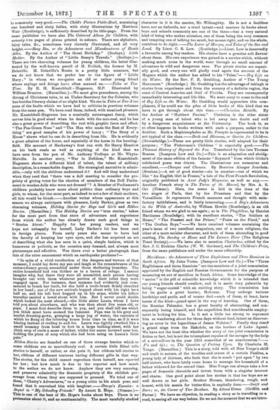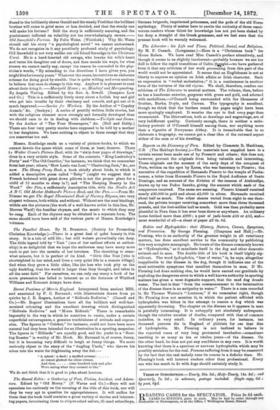Meridiana : the Adventures of Three Englishmen and Three Russians
in South Africa. By Jules Verne. (Sampson Low and Co.)—The " Three. Englishmen and three Russians " are the members of a joint commission appointed by the English and Russian Governments for the purpose of measuring an aro of meridian in South Africa. Some knowledge of the. " metro " is the pill of scientific knowledge which it is intended that. our young friends should swallow, and it is made very palatable by being "sugar-coated" with an exciting story. Tho commission has for its guide a great hunter, Mokoum. They undergo various hardships and perils, and of course find—such of them, at least, have tastes of the kind—grand sport in the way of hunting. One of them, the Russian Palander, has a great faculty of abstracting, and con- sequently losing himself, and the expedition find considerable employ- ment in looking for him. Is it not a little too strong to represent him as wandering about for three days without food, intent on discover- ing an error in the logarithms of James Wolston 7 Finally they stand' a grand siege from the Makololo, on the borders of Lake Again'. We have not the least idea whether the story of the joint commission is fiction or fact, but is not the triumphant repulse of the savages by the help- of a mitrailleuse in the year 1854 somewhat of an anftchronism ?- P's and Q's ; or, The Question of Putting Upon. By Charlotte Af. Yongo. (Macmillan.) This is a story, told with all Miss Vonge's skill' and truth to nature, of the troubles and errors of a certain Pauline, a young lady of thirteen, who feels that she is much " put upon " by two half-sisters, who have lately come home to manage the household of a father widowed for the second time. Miss Yong° can always take a few pages of domestic chronicle and invest them with a singular interest and charm. One good point about her stories is that her boys are as well drawn as her girls. Brother Horace, blundering, rough, and honest, with his mania for butterflies, is capitally done.—Siorft and' Sure; or, the Career of Two Brothers. By Alfred Elwes. (Griffith and. Farrar.) We have an objection, in reading a story as in travelling on a road, to seeing all our way before. Do we not the moment that we are intro-
aimed to the brilliantly clever Gerald and the steady Fred that the brilliant brother will come to grief more or less decided, and that the steady one will make his fortune? Still the story is sufficiently amusing, and the punishment inflicted on volatility not too overwhelmingly severe.— Old
Snowfield's Fortune. By Felix Weiss. (Whitfield.) Why Mr. Weiss should call his story "a psychological novel" we cannot understand. We do not recognise in it any peculiarly profound study of psychology. Old Snowfield is not very unlike our old friend Scroodge in the Christmas Carol. He is a hard-hearted old savage, who breaks his wife's heart and turns his daughter out of doors, and then mends his ways, for what reason we cannot easily say, except the reason be concealed in the phy- sician's words, "By attending to the directions I have given you, you mightlive fortwenty years." Whatever the cause, he contrives an elaborate scheme for doing good by stealth. One is quite willing and even anxious to believe that men do change in this way. Anyhow it is pleasant to read about their doing it.—Marigold Manor; or, Mischief and Merrymaking. By Angela Waring. Edited by the Rev. A. Sewell. (Sampson Low and Co.) This is a sufficiently lively story about a foolish boy and girl who get into trouble by their obstinacy and conceit, and get out of it much improved.—Stories for Workers. By the Author of " Copsley Annals," &o. (Seeleya.) A series of prettily written little stories, but with the religions element more strongly and formally developed than we should care to do in dealing with children.—Twilight and Dawn. Ey the Author of " The Four Messengers," &c. (Bell and Delay.) There are four very pretty stories here supposed to be told by a mother to her daughters. We have nothing to object to them except that they are somewhat too sad.











































 Previous page
Previous page